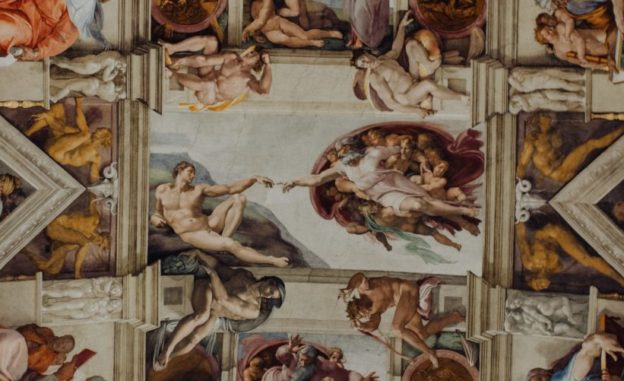Scripture focus:
You can ask for anything in my name, and I will do it, because the work of the Son brings glory to the Father. Yes, ask anything in my name, and I will do it! (John 14:13-14, NLT)
Very soon we will be celebrating the resurrection of Jesus of Nazareth, by God through the power of the Holy Spirit. This transformative, mind-boggling, life-altering event points us to the future that God has planned for us and reminds us that we follow a God who brings dead things back to life and makes all things new.
This is tremendous news on its own, but there’s more! Through prayer, each of us is given the opportunity to participate in this productive, creative work of God. Prayer is the “shaping power of the future” [1] – the force God places at our disposal so that we might join God in creating what is yet to be.
Science has always fascinated me. I don’t always understand, but I’m always in awe of the many mysteries of the universe. One area that I find intriguing is quantum mechanics, the study of subatomic interactions. Researchers in this field theorize and offer evidence that the world does not come into being until a mind interacts with it. They have conducted experiments in which measuring the spin of one subatomic particle has, oddly enough, caused a twin particle miles away to have the opposite spin! It’s as though the observer is creating reality.
An equally mind-blowing finding comes from research in quantum physics where particles have been discovered that take on properties in direct proportion to the expectations of the people watching them. Though I can’t comprehend the full meaning of that discovery, it brings to my mind the image of millions of creative particles floating in our universe, each awaiting our direct instruction.
Years ago, Oscar Osorio was a drug-addicted, violent criminal in Villa Hermosa, Colombia. Oscar had grown up poor, resorting to stealing when he was still a young boy. He graduated to drug dealing, armed robbery, and violence. By the time he was in his late twenties, he had been in and out of jail numerous times, including Bellavista National Jail, which was one of the most dangerous prisons in the world at that time. One day, as he was sleeping off a drug binge that had left him lying on a sheet of cardboard for three days in a semiconscious stupor, he encountered pastor Jairo Chalarca. As Pastor Jairo passed Oscar, he said, “Jesus loves you and he wants to change your life.” Somehow those words penetrated Oscar’s drug-clouded head and he looked up. Chalarca began talking with him about the plans God had for him, plans far greater than sleeping on cardboard on the street, plans that had yet to be. He invited Oscar to church. Surprisingly, Oscar got up and followed him and as he listened to Pastor Jairo preach that day, Oscar wept for the first time in years. He felt himself begin to change. He heard Chalarca say, “Jesus Christ knows you. He knows exactly what condition you are in. If you come to know Christ, he will raise you up. He will change your life. If you want to meet Christ today, come forward and we will pray with you.
Oscar went to the front of the church and told Pastor Jairo he wanted the life he was speaking of, he wanted to know Jesus. Pastor Jairo put his hands on Oscar’s shoulders and began to pray. Afterwards, Oscar had difficulty putting into words what happened to him during that prayer; but he said it was something like feeling that a ton of weight was bearing down on him and he could not get out from under it. The weight was crushing him, suffocating him; but suddenly it was lifted, and he felt buoyant, strong, and free. The freedom he gained from that prayer affected his entire life. He stopped doing drugs. He left his life of crime and violence behind. The plans that had yet to be began to take shape. He got a job, became active in his church, and ultimately began fulltime ministry, preaching the gospel in Bellavista, the jail that had once housed him as an inmate.
Not all of us have stories as dramatic as Oscar Osorio. Yet, though his experience of Jesus Christ made manifest through prayer, he was able to see his future, not as a weight crushing down on him, but as a blank canvas upon which he and God could write.
We are granted the opportunity to experience that as well. Our lives may be complicated and busy. There may be elements that hem us in, weigh us down, and stress us out. But regardless of how difficult our present may be, our future is a blank canvas placed before us. Through prayer we are given the opportunity to participate in the works of God in the world – to join with God in creating what is yet to be – to write with God upon the canvas of our lives. Like the particles hovering in our universe waiting to comply with our expectations, we join with God in creating what is yet to be through the creative power of prayer.
As you fast and pray in this resurrection season, remember that we follow a God who brings dead things back to life and makes all things new. Remember that through your praying, you can tap into that shaping power of the future and join with God in creating what is yet to be.
[1] Laurie Beth Jones, Jesus in Blue Jeans, p122








